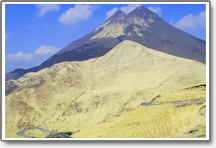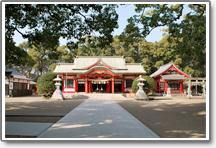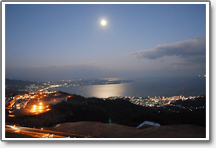|
Oita prefecture is located in the north east part of Kyushu, with the Suo Sea in the north and the lyo Sea in the East, facing the Bungo Channel. The area has long been called the "Land of Abundance". At the end of the 7th century, current Oita was split into two countries: Buzen and Bungo. At the beginning of the 13th century during the Kamakura period, Otomo came to Bungo as a guardian. His family's rule then continued for 400 years. In Otomo Sorin's era, his rule extended to 6 countries in the northern region of Kyushu excluding Bungo.
Otomo Sorin actively
adopted Christianity and Western culture. In addition to Sorin's activities
throughout the prefecture, The Usuki area allowed ships from China and
Portugal in and participated in overseas trade.
Otomo was overthrown by Toyotomi Hideyoshi in the 16th Century, and the
domain was divided up into extremely small regions. This era of separation
continued for approximately 300 years until the beginning of the Meiji
era.
Clan land holdings
were abolished, and prefectures were established in 1871. Shimoge and
Usa districts of Buzen were incorporated, and in 1876 the present prefectural
regions were decided upon. Oita prefecture currently consists of 11 cities,
36 towns and 11 villages.)
The Kirishima Volcanic
Zone that runs north to south of the prefecture and the Hakusan Volcanic
Zone in the north west cause hot springs to gush out all over the prefecture
and thus Oita has the largest number of hot springs in the country. It
also has some of Japan's most popular hot spring resorts. The ocean front
totals a length of 746 km with a shoaling beach in the north. Beppu Bay,
located in the central area and a rias coastline in the south, this prefecture
is blessed with an abundant and rich variety of marine resources.
The climate in Oita
is generally mild, however due to complicated topographical features,
the prefecture is divided into 5 climate regions. These are the inland
sea region with a mild climate and little rainfall, the Japan Sea with
a great deal of rain and snow in winter, the southern coast with a great
deal of warm rainfall, the mountainous region with a great deal of cool
rainfall and the inland area with a severe difference in temperature in
summer and winter with a great amount of rain.
(Information extracted
from: http://www.pref.oita.jp/english)
For more detailed
information please visit Oita Prefecture's official web site at:
http://www.pref.oita.jp/english
|



